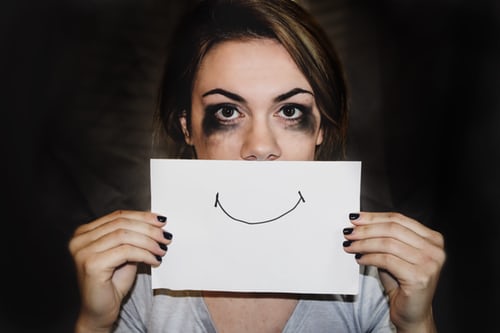Do you know how to control anxiety?
Do you know how to overcome that weird sensation that happens just before any moment of danger or important event, be it real or created by your head?
While many people still treat this sensation as “freshness,” knowing how to control anxiety can be the missing piece for you to achieve goals and overcome your personal challenges.
If you often have symptoms such as an empty stomach, fast heartbeat, intense fear, chest tightness, or excessive sweating, you may have an anxiety-related disorder.
If so, keep reading this post to find out:
- Why Knowing How To Control Anxiety Is Key To A Full Life
- What is anxiety and when does it become a disease
- How to Control Anxiety in 6 Practical Steps
Let’s start by understanding why knowing how to control anxiety is a fundamental skill these days.
Why Knowing How To Control Anxiety Is Key To A Full Life
Have you ever felt it?
The feeling of having an event ahead of you and having to deal with problems, real or imagined, long before they really happen?
It starts as a simple concern.
In a little while, it is a feeling that disturbs your sleep. He insists on staying in your head – until it starts to really mess up your life .
This is where anxiety ceases to be a natural sensation for any human being and becomes a problem.
A problem that makes it difficult to achieve your goals, meet your challenges and achieve your life goals.
That’s why knowing how to control anxiety is such a fundamental skill these days.
According to the National Institute of Mental Health , anxiety disorders are the most common mental illness in the United States, affecting 18% of the population .
So if you know how to perform this control with mastery by following the practical steps taught in this post, you will soon begin to get results that were previously unimaginable.
Living with anxiety is like having to run a marathon carrying a heavy sandbag on your back.
Knowing how to control it will allow you to run free, lighter and much more likely to cross the finish line as planned.
Especially if all your competitors keep running with the sandbag on their backs.
Interested in running for life this way? So let’s know a little more about exactly what anxiety is.
What is anxiety and when does it become a disease
Technically speaking, anxiety is a sensation that many animals (including humans) experience before a moment of danger or challenging event.
In the case of humans, this danger can be real (such as anxiety before surgery, for example) or imaginary (such as nervousness in having to talk to a stranger).
Anxiety manifests in the body through unpleasant sensations such as:
- Stomach emptiness
- Heart beating fast
- Intense fear
- Chest tightness
- Excessive sweating
Biologically, such changes in the nervous system serve to alert the animal to the oncoming sense of danger.
That would be the “natural” function of anxiety, which is positive for the person who feels it.
The problem, as said, is when we do not know how to control anxiety and it ends up hindering the achievement of various goals.
Like when you stop getting a job promotion or closing a deal because you can’t control your nervousness when talking to other people, for example.
When this kind of situation begins to get worse, running away from the normal anxiety curve, the person can be diagnosed with some anxiety disorder, such as Generalized Anxiety Disorder (GAD).
What Are Anxiety Disorders
Excessive anxiety can lead to what health professionals call anxiety disorders . A group of mental disorders characterized by strong feelings of anxiety and fear.
There are several types of anxiety disorders, which vary according to the causes of the symptoms. Some of the best known are:
- Generalized Anxiety Disorder (GAD)
- Social Anxiety Disorder
- Separation Anxiety Disorder
- Agoraphobia
- Claustrophobia
- Panic Disorder
Importantly, anxiety disorders are diagnosed as diseases and, as such, need to be treated by skilled health professionals.
If you have any of these disorders and have come to this post in consultation with Dr. Google to learn how to control anxiety, we recommend that you seek medical attention as soon as possible.
Anxiety disorders are diseases that can have serious consequences and are often linked to episodes of depression and burnout syndrome .
And they can and should be treated with proper medical advice.
In this post, we will give tips simply to anyone who wants to know how to control normal anxiety, the one that affects everyone.
If you only suffer from natural anxiety but don’t have any anxiety disorder (or a suspected disorder), let’s move on with practical tips on controlling anxiety.
Anxiety Disorders Symptoms
If you are unsure whether you feel natural anxiety or if you have an anxiety disorder, take a look at the list of symptoms below.
Symptoms may point to some type of disorder.
So if you often feel one or more of them and they are disrupting your day to day, see a doctor for a reliable diagnosis.
Physical symptoms
- Dizziness
- Itching and skin pricks
- Heartbeat Changes
- Increased blood pressure
- Excessive tension in body and face muscles
- Increased need to use the toilet
- Excessive sweating
- Digestive problems
- Biting nails
Emotional symptoms
- Feeling of anguish
- Feeling of excessive worry
- Feeling nervous
- Panic Attacks
- The world seems to accelerate and slow down
Psychological symptoms
- Anticipation of bad events for no obvious reason
- Widespread pessimism
- Irrational fears
- Pushy thoughts you can’t get rid of
Social symptoms
- See danger in all situations
- Feeling that everyone is watching you and knowing that you are anxious
- Difficulty talking about the problem with others
General symptoms
- Feeling sick without any other symptoms
- Inability to sleep for long periods
- Inability to relax
- Difficulty maintaining focus and concentration
As you can see, the symptoms are very generic and common. Almost all of us have felt them at one time or another.
What will characterize an anxiety disorder is the frequency and intensity with which these symptoms manifest.
When in doubt, seek medical attention for a reliable diagnosis.
But if your anxiety is not excessive to the point of setting up a disorder, follow us to learn how to control anxiety in a practical, objective and reliable manner.
How to Control Anxiety in 6 Practical Steps
1. Identify and address the causes of anxiety.
The first step in knowing how to control anxiety is so obvious that a lot of people miss it.
It requires that you:
- Note the causes of your anxiety
- Eliminate or reduce these causes
- Observe the results of such elimination or reduction
In this first step, you will be acting as a scientist of yourself.
That is, you have identified a problem (anxiety). Now you need to identify the causes of the problem to reduce or eliminate them so that you can verify the practical results.
You can start by investigating some causes and risk factors commonly associated with anxiety, such as:
- Genetics (family history of anxiety disorders)
- Stressful home or work environment
- Pessimistic or reactive mindset
- Physical diseases that cause excessive concern
- Traumatic events
- Stress accumulation
- Bad eating habits
- Sedentary lifestyle
- Substance Abuse Like Alcohol, Cigarette And Other Drugs
Identify which of these causes can have the greatest impact on your anxiety.
Try to reduce it considerably, even for a certain period of time. Then watch if your anxiety has subsided.
Do this over and over until you find a lifestyle that makes you less anxious.
2. Improve your nutrition
Eating well is the cornerstone of any health problem.
The type of food you eat has a direct bearing on how your brain works.
And it’s not because you’re not overweight and have a low-fat percentage that you don’t have to watch your diet.
So, especially if you often eat processed foods, sugar and grains, change your diet and observe the results in your anxiety.
Foods That Fight Anxiety According to Science
According to Harvard University studies , there are certain foods that have a more direct effect for those who want to know how to control anxiety:
- Magnesium-rich foods like spinach, walnuts and swiss chard
- Zinc rich foods such as eggs, cashews and liver
- Omega 3 rich foods such as fatty fish, chia and flaxseed
- Probiotic-rich foods such as pickles, chayote, kefir and pickled vegetables
- Foods rich in vitamin B such as avocado and almonds
- Foods rich in antioxidants such as berries, ginger and turmeric (turmeric)
- Asparagus, thanks to the presence of folic acid
As you can see, they are all natural foods, perfectly fitting the definition of real food.
3. Practice exercises, especially outdoors
Good health will reduce many types of psychological problems, including anxiety.
And good health depends fundamentally on three pillars, in order of importance: good nutrition, good sleep and an active life.
The problem is that adjusting sleep when suffering from anxiety without taking medication is a difficult task.
Then you get into a vicious cycle: you sleep bad because you’re anxious and you’re anxious because you sleep badly.
To break this cycle, a good strategy is to practice exercise, especially outdoors. A moderate sun exposure proven helps fight the many ills of mind.
And make no mistake, you can beat a sedentary lifestyle without having to spend a dime on gym, food supplements or anything else.
In addition to all the known health benefits, exercise helps regulate sleep. You should only avoid doing the exercises at night, very close to bedtime.
4. Try to meditate
A 2010 scientific study by researchers Stefan Hofmann, Alice Sawyer, Ashley Witt, and Diana Oh proved that meditation practice is an effective strategy for fighting anxiety.
In a meta-analysis, the researchers reviewed 39 scientific studies, with 1,140 participants who tested the practice of meditation.
The results show that meditation is moderately effective in fighting anxiety and improving mood in the average participant.
For those suffering from anxiety disorders, meditation has shown even more robust results, being classified as a promising intervention in the treatment of this type of disorder.
5. Listen to this song
The use of music as therapy for those who want to know how to control anxiety is old.
Recently, however, a group of neurologists from the British company The Mind Lab have researched which specific songs are most effective for reducing anxiety.
According to Dr. David Lewis-Hodgson, Marconi Union’s Weightless song is able to reduce anxiety by 65% .
6. Focus on the present moment
The ancient Chinese philosopher known as Lao Tzu is attributed the following thought:
If you are depressed, you are living in the past.
If you are anxious, you are living in the future.
If you are at peace, you are living in the present.
Living the present moment with mindfulness, therefore, is the key to healing not only excess anxiety but virtually all ills of the mind.
It is no coincidence that ancient traditions such as Buddhism, Taoism, and Hinduism attach so much importance to the practice of focusing on the present moment.
Meditation itself can be seen as a practice so as not to cling to the ideas the mind creates all the time – a practice to always remember where we are.
At the present time, we are rarely living in a situation of danger, pain, or stress that justifies the concerns that often plague us.
Focusing on the present moment is not easy, but it is a skill that can be learned from constant practice.
Whenever you find yourself pondering how to control anxiety, gently bring your attention to the present moment and see how other worries seem to dissolve instantly.
To recap: Anxiety has a cure
We have come a long way here.
We have seen why knowing how to control anxiety is important. We understand the difference between natural anxiety and anxiety disorders.
And we studied 6 practical strategies for reducing anxiety:
- Identify and combat the causes of anxiety
- Improve Your Diet and Eat Anxiety-Fighting Foods
- Practice exercises, especially outdoors
- Try to meditate
- Listen to Marconi Union’s Weightless song
- Focus on the present moment
If you have identified with an anxiety disorder, we recommend once again that you seek medical attention to begin treatment.
If you simply want to know how to control anxiety, we suggest that you try the 6 practical steps for a while and then come back here to comment on the results.
By the way, use the comments box below to leave a question, suggestion or criticism about the article. We’d love to hear from you.










![500+ Beautiful Good Night Images [Best Collection] Cute Good Night Images](https://121quotes.com/wp-content/uploads/2019/10/Cute-Good-Night-Images-100x70.jpg)


![Top 5 Tips for Living Alone For the First Time[ What You Need to do ] Top 5 Tips for Living Alone](https://121quotes.com/wp-content/uploads/2019/12/Top-5-Tips-for-Living-Alone-100x70.jpg)